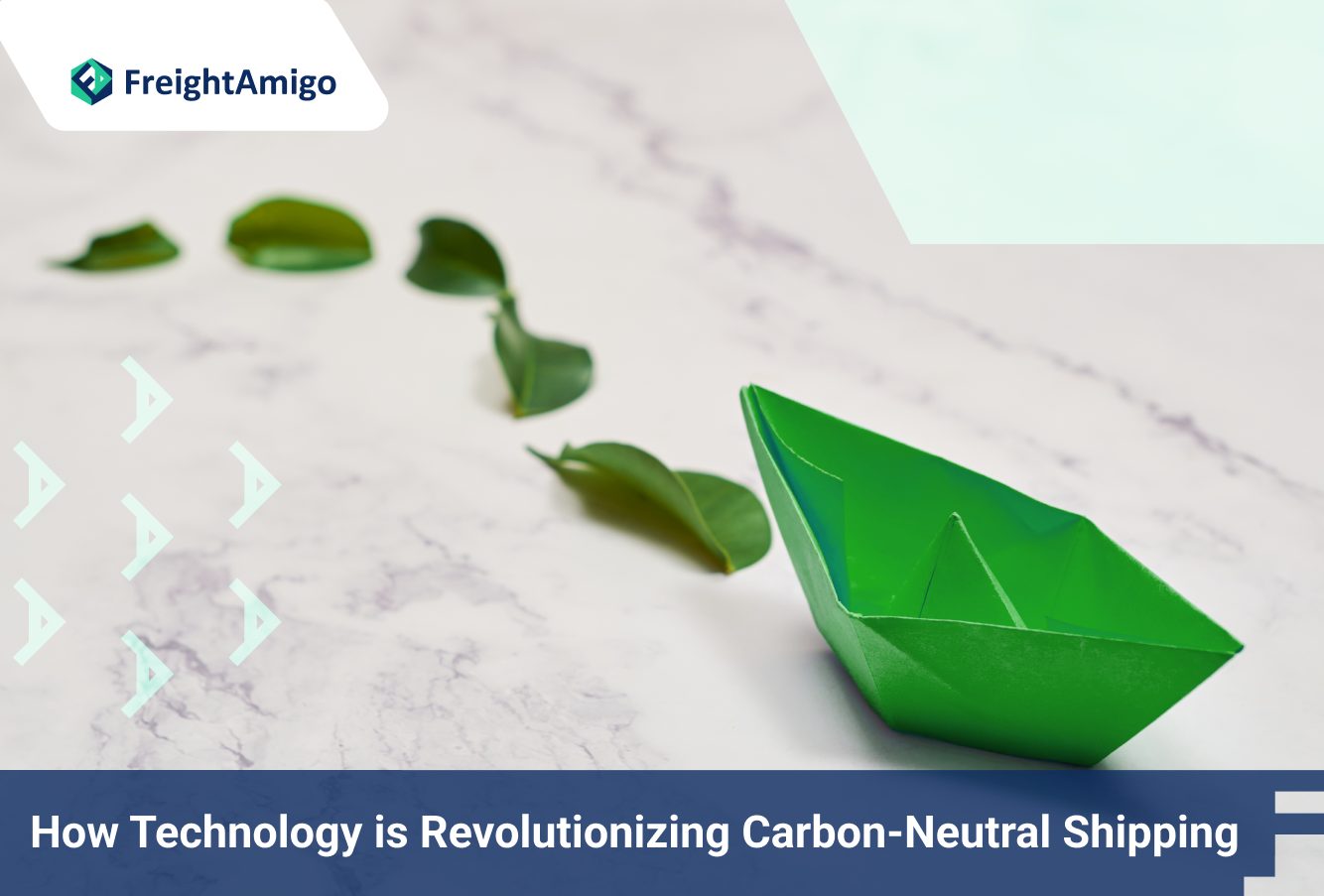Author Name: Tiffany Lee – Marketing Analyst at FreightAmigo
In today’s world, where climate change is a pressing concern, every industry must take steps to reduce its environmental impact. One industry that often goes unnoticed is shipping. Ships play a vital role in global trade, but their carbon emissions are a significant contributor to greenhouse gas emissions. This article explores the importance of decarbonising shipping and the steps companies can take to sail towards a greener future.
Want To Compare The Best Express, Air Freight, Sea Freight, Rail Freight & Trucking Rates So As To Have Better Control On Cost?
The Environmental Impact of Shipping
Shipping is responsible for a significant proportion of global carbon emissions, accounting for around 2.5% of the total. This figure may seem small, but when you consider the sheer volume of goods transported by ship, the environmental impact is significant. In addition to carbon dioxide, ships emit other pollutants such as sulphur dioxide and nitrogen oxide, which contribute to air pollution and have adverse effects on human health and marine ecosystems.
What is Shipping Decarbonisation?
Shipping decarbonisation refers to the process of reducing carbon emissions from the shipping industry. This can be achieved through a number of means, including the use of cleaner fuels, improved energy efficiency and the adoption of new technologies. The ultimate goal is to achieve net-zero carbon emissions, where any remaining emissions are offset through carbon capture or other methods.
The Importance of Decarbonising Shipping
The importance of decarbonising shipping cannot be overstated. As noted above, shipping is a significant contributor to global carbon emissions. By taking steps to decarbonise, the industry can have a significant positive impact on the environment. Moreover, decarbonising shipping is in line with international climate goals, such as the Paris Agreement, which aims to limit global warming to well below 2 degrees Celsius. The shipping industry must play its part in achieving these goals.
Current initiatives to Decarbonise Shipping
Recognising the urgent need to reduce emissions, the shipping industry has begun to take steps towards decarbonisation. The International Maritime Organization (IMO), a specialised agency of the United Nations, has set ambitious targets for the industry. The IMO aims to reduce greenhouse gas emissions from international shipping by at least 50% from 2008 levels by 2050. To achieve this, the industry is exploring various options, including alternative fuels such as hydrogen and ammonia, and improving energy efficiency through design changes and operational measures.
Challenges and Barriers to Decarbonising Shipping
While the goals of decarbonising shipping are admirable, there are several challenges and barriers that need to be addressed. One major challenge is the cost of switching to cleaner fuels and technologies. These alternatives are often more expensive than traditional fuels, making them financially prohibitive for many shipping companies, especially smaller ones. In addition, many ports and regions currently lack the infrastructure required for the widespread use of cleaner fuels. Overcoming these challenges will require cooperation between governments, industry stakeholders and financial institutions.
The Economic Benefits of Decarbonising Shipping
Despite initial costs, decarbonising shipping can bring significant economic benefits in the long term. Transitioning to cleaner fuels and technologies can lead to fuel savings, as well as reduced maintenance and operating costs. In addition, investment in decarbonisation can drive innovation and create new job opportunities in sectors such as renewable energy and green technology. In addition, adopting sustainable practices can enhance a company’s reputation and attract environmentally conscious customers.
Steps Companies can Take to Decarbonise Shipping
Companies in the shipping industry can take several steps to decarbonise shipping. First, they can invest in more fuel-efficient vessels and retrofit existing vessels to improve energy efficiency. Secondly, companies can research and invest in alternative fuels, such as biofuels or hydrogen, which have lower carbon emissions. In addition, optimising shipping routes and using digital technology can help reduce fuel consumption. Finally, companies can work with other industry stakeholders, governments and environmental organisations to drive innovation and create a more sustainable shipping sector.
Conclusion: The Future of Shipping Decarbonisation
The decarbonisation of shipping is not just an aspiration; it is a necessity for a greener future. The shipping industry must rise to the challenge and take decisive action to reduce its carbon emissions. By investing in cleaner fuels, improving energy efficiency and adopting new technologies, the industry can make a significant contribution to the global effort to combat climate change. The economic benefits of decarbonising shipping, together with the positive impact on the environment and human health, make it an imperative for shipping companies. Let us sail together towards a greener future.
There Are Different Options For Cargo Transportation. If You Want To Choose The Most Convenient And Suitable Solution, It Is Best To Have The Full Support Of Logistics Experts! If You Are Planning To Ship Goods Overseas, Please Go To The FreightAmigo Page For Inquiries.
===
Read More:
【Cosmetic Product Recycling】 A Guide to Sustainable Reverse Logistics
【Rise of Green Supply Chain】 Pioneering Sustainable Practices in Logistics
【ESG in Logistics】 How ESG Practices Drive Social Responsibility in Logistics
===
If you have any inquiries on logistics/supply chain, feel free to contact FreightAmigo now:
Chat with us online OR
Phone : +852 28121686
WhatsApp: +852 27467829









































